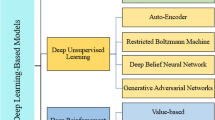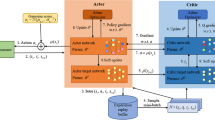Abstract
Aiming at the problems of increased latency and energy consumption and decreased service quality caused by current vehicle networks, this paper proposes a computing offloading resource allocation strategy based on deep reinforcement learning in Internet of Vehicles. Firstly, the system architecture for Internet of Vehicles is designed, calculation model and communication model of computing offloading strategy are constructed. Then, the resource allocation problem in offloading process is studied for real-time energy-aware offloading scheme in mobile edge computing. Besides, considering the battery capacity of vehicle users, the remaining energy rate is utilized to redefine weighting factors to sense energy consumption in real time. Finally, with the shortest delay and smallest computational cost as optimization goals, Q-learning is used to achieve the optimization of offloading strategy, that is, the optimal allocation of communication and computing resources, and the best system security. The simulation results show that the delay of the proposed algorithm is 0.442 s when the computational complexity is 9000 cycles/byte, and the performance of the delay is improved compared with the other three algorithms.
Similar content being viewed by others
References
Ke, Z., Supeng, L., He, Y., et al.: Cooperative content caching in 5G networks with Mobile edge computing[J]. IEEE Wirel. Commun. 25(3), 80–87 (2018)
Anta, H., Demo, N.N.: LL-MEC a SDN-based MEC platform[C]// the 23rd annual international conference. Snowbird: ACM Press, 483–485 (2017)
Gill, S.S., Buyya, R.: Resource provisioning based scheduling framework for execution of heterogeneous and clustered workloads in clouds: from fundamental to autonomic offering[J]. J Grid Comput. 17(1), 385–417 (2018)
Shakarami, A., Ghobaei-Arani, M., Masdari, M., et al.: A survey on the computation offloading approaches in Mobile edge/cloud computing environment: a stochastic-based perspective[J]. J Grid Comput. 18(4), 1–33 (2020)
Abdulrahman, A.: Deng Yong, Wei Guiyi, et al. collaborative security in vehicular cloud computing: a game theoretic view[J]. IEEE Netw. 32(3), 72–77 (2018)
Ahmad, I., Noor, R. M., Ali, I.: et al. The role of vehicular cloud computing in road traffic management: a survey[C]// the 1st international conference on future intelligent vehicular technologies. Porto: Springer Press, 123–131 (2016)
Abbasi, M., Pasand, E.M., Khosravi, M.R.: Workload allocation in IoT-fog-cloud architecture using a multi-objective genetic algorithm[J]. J Grid Comput. 18(1), 43–56 (2020)
Lei, K., Fang, J., Zhang, Q., Lou, J., du, M., Huang, J., Wang, J., Xu, K.: Blockchain-based cache poisoning security protection and privacy-aware access control in NDN vehicular edge computing networks[J]. J Grid Comput. 18(6), 593–613 (2020)
Wang, P., Chao, Y., Zheng, Z., et al.: Joint task assignment, transmission, and computing resource allocation in multilayer Mobile edge computing systems[J]. IEEE Internet Things J. 6(2), 2872–2884 (2019)
Feng, W., Hong, X., Jie, X: Optimal Resource Allocation for Wireless Powered Mobile Edge Computing with Dynamic Task Arrivals[C]// ICC 2019–2019 IEEE international conference on communications (ICC). Shanghai: IEEE Press, 1–7, (2019)
Qiaorong, L, Zho. S, Yilong, H: Computation Offloading Scheme to Improve QoE in Vehicular Networks with Mobile Edge Computing[C]// 2018 10th International Conference on Wireless Communications and Signal Processing (WCSP), 1–5, (2018)
Wu, S., Weiwei,. X., Wenqing, C: et al. An Efficient Offloading Algorithm Based on Support Vector Machine for Mobile Edge Computing in Vehicular Networks[C]// 2018 10th international conference on wireless communications and signal processing(WCSP). Hangzhou: IEEE Press, 1–6, (2018)
Zhenyu, Z, Pengju, L., Zheng, C: et al. Energy-efficient workload offloading and power control in vehicular edge computing[C]// 2018 IEEE wireless communications and networking conference workshops (WCNCW). Barcelona: IEEE Press, 191–196 (2018)
Du Dai Yueyue, X., Maharjan, S., et al.: Artificial intelligence empowered edge computing and caching for internet of vehicles[J]. IEEE Wirel. Commun. 26(3), 12–18 (2019)
Du Dai Yueyue, X., Maharjan, S., et al.: Joint load balancing and offloading in vehicular edge computing and networks[J]. IEEE Internet Things J. 6(3), 4377–4387 (2019)
Kim Y., An N., Park J., et al. Mobility Support for Vehicular Cloud Radio-Access-Networks with Edge Computing[C]// 2018 IEEE 7th international conference on cloud networking (cloud net). Tokyo: IEEE Press, : 1–4, (2018)
Yi, L., Yu, H., Xie, S., et al.: Deep reinforcement learning for offloading and resource allocation in vehicle edge computing and networks[J]. IEEE Trans. Veh. Technol. 68(11), 11158–11168 (2019)
Ke, Z., Supeng, L., He, Y., et al.: Cooperative content caching in 5G networks with Mobile edge computing[J]. IEEE Wirel. Commun. 25(3), 80–87 (2018)
Mustafa A. M., Abubakr O. M., Ahmadien O.: et al. Mobility Prediction for Efficient Resources Management in Vehicular Cloud Computing[C]// 2017 5th IEEE international conference on Mobile cloud computing, services, and engineering (Mobile cloud). San Francisco: IEEE Press, 53–59, (2017)
Aissioui, A., Ksentini, A., Gueroui, A.M., Taleb, T.: On enabling 5G automotive systems using follow me edge-cloud concept[J]. IEEE Trans. Veh. Technol. 67(6), 5302–5316 (2018)
Hu, L., Yuanwen, T., Yang, J., et al.: Ready player one: UAV-clustering-based multi-task offloading for vehicular VR/AR gaming[J]. IEEE Netw. 33(3), 42–48 (2019)
Long, Z., Zhen, Z., Wu, Q., et al.: Energy-aware dynamic resource allocation in UAV assisted Mobile edge computing over social internet of vehicles[J]. IEEE Access. 6, 56700–56715 (2018)
Ravi, A., Peddoju, S.K.: Handoff strategy for improving energy efficiency and cloud service availability for mobile devices[J]. Wirel. Pers. Commun. 81(1), 101–132 (2015)
Jiao, Z, Fengyuan. R, Lin C: Delay guaranteed live migration of virtual machines[C]// IEEE INFOCOM 2014-IEEE conference on computer communications. Toronto: IEEE Press, 574–582, (2014)
Joshi, G., Vig, R., Singh, S.: DCA-based unimodal feature-level fusion of orthogonal moments for Indian sign language dataset[J]. IET Comput. Vis. 12(5), 570–577 (2018)
Abbas, N.: Zhang Yan, Taherkordi a., et al. Mobile edge computing: a survey[J]. IEEE Internet Things J. 5(1), 450–465 (2017)
Quan, Y., Haibo, Z., Jinglin, L., et al.: Toward efficient content delivery for automated driving services: An edge computing solution[J]. IEEE Netw. 32(1), 80–86 (2018)
Peng X B , Abbeel P , Levine S: et al. DeepMimic: Example-Guided Deep Reinforcement Learning of Physics-Based Character Skills[J]. ACM Transactions on Graphics, 2018, 37(4CD):143.1–143.14
He, Y., Zhao, N., Yin, H.: Integrated networking, caching, and computing for connected vehicles: a deep reinforcement learning approach[J]. IEEE Trans. Veh. Technol. 67(1), 44–55 (2018)
Xiong R , Cao J , Yu Q: Reinforcement learning-based real-time power management for hybrid energy storage system in the plug-in hybrid electric vehicle[J]. Applied Energy, 2018, 211(FEB.1):538–548
Acknowledgments
This work was supported by 2019 Domestic Visiting Training Project for Outstanding Young Backbone Teachers in Colleges and Universities in Anhui Province (No.gxgnfx2019050) and the Non-financial Research Projects of Suzhou University Anhui Province (No. 2020xhx094).
Data Availability Statement
The data included in this paper are available without any restriction.
Author information
Authors and Affiliations
Corresponding author
Additional information
Publisher’s Note
Springer Nature remains neutral with regard to jurisdictional claims in published maps and institutional affiliations.
Rights and permissions
About this article
Cite this article
Li, X. A Computing Offloading Resource Allocation Scheme Using Deep Reinforcement Learning in Mobile Edge Computing Systems. J Grid Computing 19, 35 (2021). https://doi.org/10.1007/s10723-021-09568-w
Received:
Accepted:
Published:
DOI: https://doi.org/10.1007/s10723-021-09568-w




